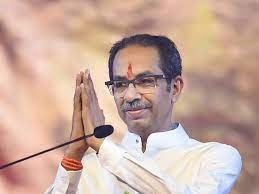In a recent media interview, Uddhav Thackeray, the leader of Shiv Sena (UBT) and former Chief Minister of Maharashtra, expressed his views on the political landscape and the actions of his former ally, the Bharatiya Janata Party (BJP). Thackeray highlighted the trend of people voting against the BJP wherever there was a strong Opposition party, suggesting that the BJP might resort to communal polarization in an attempt to regain its lost ground.
Thackeray’s interview came shortly after a Supreme Court verdict declared the Maharashtra Governor’s direction for a floor test of his government in June 2022 as illegal. He emphasized that people were shocked to witness what he termed an “illegal government” currently in power. Prior to the floor test, Thackeray had resigned, leading to a breakaway group of Shiv Sena and BJP members forming a government under Eknath Shinde, who succeeded Thackeray as Chief Minister.
During the candid conversation held at his residence, ‘Matoshree,’ Thackeray accused the BJP of being dictatorial and opportunistic when it comes to matters of Hindutva, a concept associated with Hindu nationalism. He likened the experience of being subservient to either the British or the BJP as identical, emphasizing the nature of slavery under different masters. When asked directly whether he would consider partnering with the BJP again, Thackeray deflected the question, suggesting it should be directed at the BJP instead. He questioned why the BJP had pushed him away and stated that there was no need for him to align with the Congress, but the actions of the BJP had driven him to do so.
Thackeray’s comments reflect the strained relationship between Shiv Sena and the BJP, two parties that were once allies. The political dynamics in Maharashtra have witnessed significant shifts, with people voting against the BJP in areas where there is a strong Opposition presence. Thackeray’s assertion that the BJP might resort to communal polarization to recover its lost ground indicates his concerns regarding the political strategies employed by his former ally.
The Supreme Court’s verdict on the floor test directed attention to the legitimacy of the government in power and raised questions about the decision-making process. Thackeray’s decision to resign before the floor test and the subsequent formation of a new government highlighted the internal turmoil within the alliance.
Thackeray’s criticisms of the BJP’s alleged dictatorial behavior and opportunism regarding Hindutva shed light on the ideological differences between the parties. His comparison of slavery under the British and the BJP suggests his discontent with being subservient to any master, irrespective of their identity.
The interview reflects the complexities and shifting dynamics of Indian politics. It highlights the challenges faced by political parties in maintaining alliances and navigating the demands of their constituents. As the political landscape continues to evolve, it remains to be seen how these dynamics will shape the future of Maharashtra and the relationship between Shiv Sena and the BJP.


